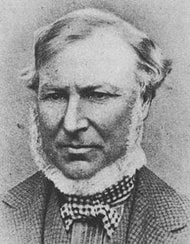 Angus McMillan
Angus McMillan BASS Coast is split. Flinders in the west; McMillan to the east. The dividing line is about to be redrawn as The Australian Electoral Commission conducts the latest redistribution of the federal electorates of Victoria.
The shape of Flinders will change but that name will remain. It’s been with us since Federation and the AEC guidelines decree that original names from 1901 shall not be changed. McMillan, named after another explorer, is a different story.
In the 1948 federal redistribution, 17 seats were added to the 20 that comprised Victoria. A three-man commission travelled the state drawing lines on maps and talking to locals about names for the new divisions. They presented a list of suggestions to Parliament.
Harold Holt, Ben Chifley and Arthur Calwell, among others, debated the final selection. During this process Chisholm usurped Lonsdale and became our first federal electorate named after a woman. Hansard records that Calwell supported naming an electorate after Burke as he was "... an Irishman and a great explorer". Like his nominee, Calwell led his party into the wilderness.
Some of those names remain; others, like Burke, have disappeared and re-appeared amid the change of boundaries.
The AEC guidelines to the naming of electorates states: “In the main, divisions should be named after deceased Australians who have rendered outstanding service to their country”.
In 1948, Angus McMillan was revered. I hesitate to say he is now reviled but for at least the past 15 years people have been asking the AEC to remove that name from our electorate.
For the 2002 redistribution, Ann Jones, convenor of the West Gippsland Reconciliation Group, submitted the following to the AEC:
The name Angus McMillan has been written into the history of Gippsland and many places are named after him. The true story of this Victorian explorer and landowner has been re-examined and become the subject of considerable debate. According to recent historians, Peter Gardiner and Don Watson and film-maker Andrew Hyde, he was an unscrupulous opportunist who does not deserve the recognition of an illustrious founding father as our earlier history books record.
His behaviour, according to those who have researched his life, may be seen as reflecting the morality of the times, but this cannot be used as an excuse for the atrocities in which McMillan was a participant. We have attached to this letter a summary of the massacres of indigenous people in East Gippsland in which Angus McMillan was involved.
There are no eyewitness accounts to which we can refer that bind McMillan to any single murder but he was the leader of the ruthless Highland Brigade that violently took land for cattle and farming. Coded journal and newspaper entries refer darkly to groups of Aborigines who were dispossessed and “did not return to the area”. Place names like Skull Creek are enduring clues to their final resting place.
Across the continent “clearing” started on the ever-expanding edge of Sydney in the 18th Century. The last recorded massacres of Aboriginal people took place in the Northern Territory in the 1920s. Spithoods in the NT and youth suicide in the Kimberley are its latest manifestation. Income quarantining in Ceduna continues the tradition of special treatment.
Rifles will always overcome sticks and stones and names do more than hurt. Words indicate whether a society is anchored to the past or is maturing into the future.
Every seven years the AEC invites submissions on the redistribution of Victorian federal electorates. There is growing support for a name change for McMillan and other electorates. A timetable for submissions, comments and objections, are on the Australian Electoral Commission website. The closing date for suggestions is November 17.
If the name is removed a replacement is required. This won’t rip McMillan from the history books and does not impose a sentence. Once a strong reason for change is accepted by the AEC, they will consult with the broad community to find a replacement and suggestions will be considered through the redistribution process.
This shouldn’t become a debate; debates have winners and losers. Let’s have a respectful, informed discussion. The 2016 Victorian Electoral Commission review of Bass Coast Shire resulted in wards named Bunurong, Island and Western Port. People like Thompson are still remembered, just in different ways.
The names of several federal electorates have changed during this decade. Fraser became Fenner in the ACT and in Tasmania Clarke has replaced Denison. The Fraser name will probably re-appear on an electorate in western Victoria this time round. Despatching McMillan is a possibility.
GUIDELINES FOR NAMING FEDERAL ELECTORAL DIVISIONS
Naming after persons
In the main, divisions should be named after deceased Australians who have rendered outstanding service to their country.
When new divisions are created the names of former Prime Ministers should be considered.
Federation Divisional names
Every effort should be made to retain the names of original federation divisions.
Geographical names
Locality or place names should generally be avoided, but in certain areas the use of geographical features may be appropriate (e.g. Perth).
Aboriginal names
Aboriginal names should be used where appropriate and as far as possible existing Aboriginal divisional names should be retained.
AEC website